Click here to download the story as a PDF
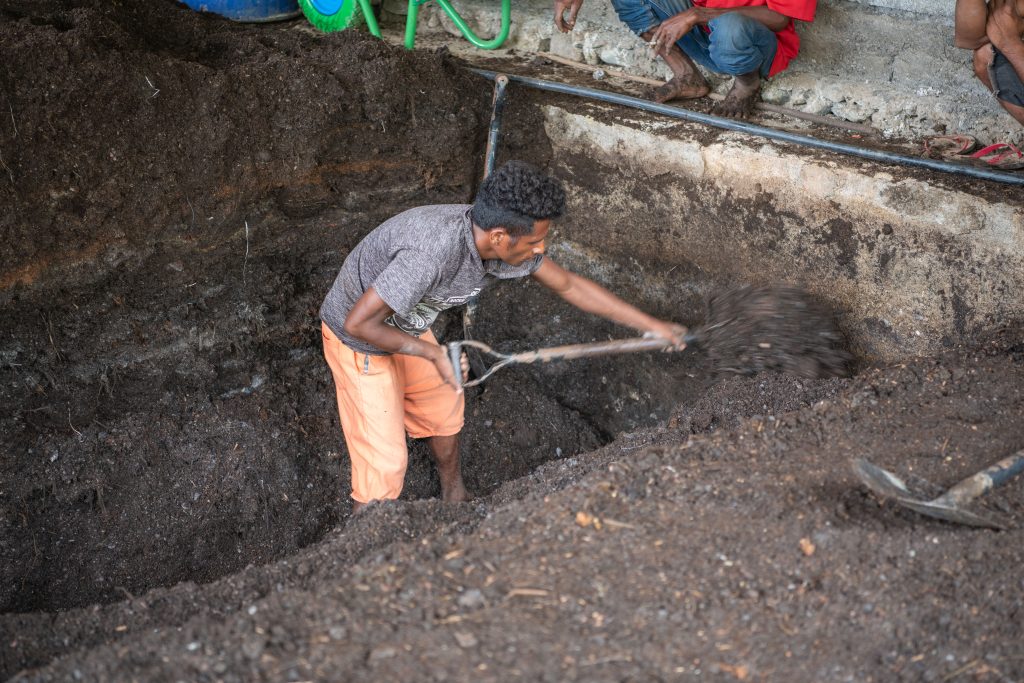

In 2020, Zaquiel Martins, director and marketing manager of Timor-Leste Organic Fertilizer (TILOFE), felt confident about compost. After several courses of study, he knew what ingredients to add to his mix and how often to turn them over. The two-year-old company had regular customers. And it was earning a total net profit of $111. Zaquiel knew, however, that TILOFE needed more than a good product. He also needed to market that product. Under the auspices of U.S. Agency for International Development’s Farmer-to-Farmer, or F2F, program, TILOFE looked forward to an assignment in 2021 when volunteers would help the organization with business administration and accounting.
Before that assignment could take place however, a different opportunity presented itself, and in an unusual set of circumstances, Zaquiel became a F2F volunteer prior to becoming a host.
To keep the program running despite travel limitations due to the COVID-19 pandemic, Farmer-to-Farmer had taken the unique step of teaming up American volunteers with local experts on the ground. Capitalizing on his knowledge of composting and vegetable production, Zaquiel was paired with Chuck Mitchell, an American soil expert, and together, they advised the 27 rural women’s vegetable grower groups that comprise Hamahon Feto Timor (HAFOTI) which translates as “Shelter for Timorese Women.” By the end of the assignment, the women of HAFOTI had learned new methods of creating and using organic composts and fertilizers. And so had Zaquiel.
Through his collaboration with Chuck Mitchell, Zaquiel was introduced to several new ways of preparing quality compost, including how to introduce milk to produce liquid compost and add rice, straw and husks to produce solid compost. He took this new knowledge back to TILOFE where it had an immediate impact.
“In the past, [TILOFE was] more focused on the quantity of the compost that we produced,
whereas now we are emphasizing its quality,” says Zaquiel. “We improved our compost, which we named Super Organic Fertilizer.”
An improvement in the quality of the compost also resulted in higher sales of the product. Before the assignment, TILOFE sold between 200 and 425 kilograms of compost (15 to 25 bags) per month, leading to a total net profit of $111. After the assignment, TILOFE sold between 1,700 and 2,550 kilograms (100 to 150 bags) per month, enabling them to earn an income of $442-$663. The increased earnings are used for operational costs such as staff incentives, compost bags, rental cars to transport compost, promotional activities on social media, and to purchase compost ingredients such as cow and chicken manure, different kinds of leaves, and ash.
“Before, we used to buy only two carts of cow manure per month,” says Zaquiel, “but now we can buy more than six carts of cow manure. “We have made a big difference in purchasing the material and producing and selling the compost.”
“In the past, [TILOFE was] more focused on the quantity of the compost that we produced, whereas now we are emphasizing its quality.”
—Zaquiel Martins
TILOFE began in December 2018, when a group of young agronomy graduates from the East-Timor Coffee Institute (ETCI) in Ermera municipality established Timor-Leste Organic Fertilizer (TILOFE). Led by youth, TILOFE’s objective is to bring together agronomy graduates, students, and unemployed youth to boost their family income and improve their livelihoods by promoting organic agriculture. The company also strives to protect the ecology, promote sustainable agriculture, and contribute to a healthy life for Timorese people. TILOFE started by promoting organic agriculture through the production of organic compost to fight against chemical compost which is bad for health and the environment.
While Zaquiel’s experience as a F2F volunteer unintentionally led to direct improvement of his company’s product, TILOFE’s experiences as a three-time recipient of F2F assignments helped them make tremendous strides in their business methods.
In September 2021, TILOFE worked with a local and remote volunteer to address basic administration and accounting issues. By the end of the assignment, the company had established a simple bookkeeping template, a bank account, and a cash book—none of which they had previously. These changes enabled TILOFE to save and plan for expansion, as well as apply for a government grant (something they were unable to do without an accounting system that reflected their finances). This will support the building of a new compost production pit and will allow them to double their compost production from 45 tons every three months to 95 tons every three months.
“Every month, I control my finances,” says Zaquiel. “I can see what our spending is.”
Although Zaquiel himself is an able marketer, tirelessly promoting TILOFE’s organic compost by taking bags to talk shows, presentations, workshops and even to every meeting he attends, the company needed consistent branding across multiple platforms. An F2F assignment in December 2022 centered around branding and marketing resulted in a branded Facebook page, brochures, business cards, t-shirts, and compost bags, plus training for 15 of TILOFE’s employees. While many of the materials are still in the process of being printed, Zaquiel is enthusiastic about the impact of the new branding. He shared brochures with Timor-Leste’s Prime Minister during a recent visit and suggests that some of the company’s success in obtaining government contracts for compost are due to the expanded marketing. The new branding has “helped me to expose TILOFE to the public,” says Zaquiel. “Now many people know TILOFE, even if we don’t have bags yet.
“Branding is very important.”
TILOFE’s third F2F assignment ended in December 2022 and focused on building in 60-month projections to the company’s already established business plan. David Daines, an agricultural economist based in Utah, made several recommendations, including identifying and implementing new activities that could enable TILOFE to provide greater value to customers in the general area of soil productivity, like offering soil testing, different kinds of fertilizer, or seeds and seedling supply.
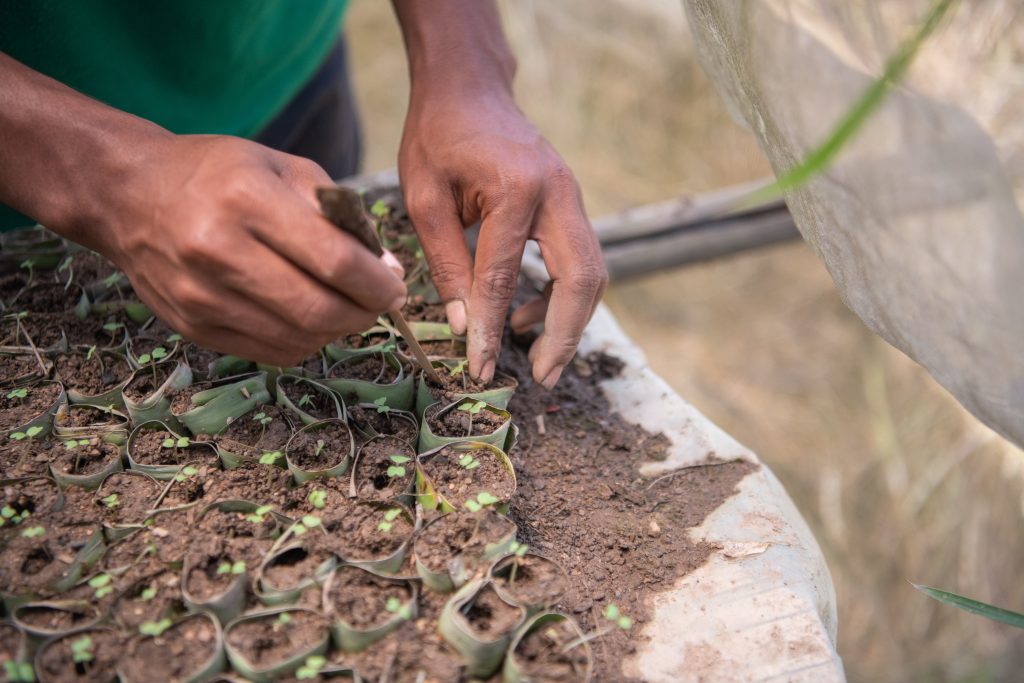
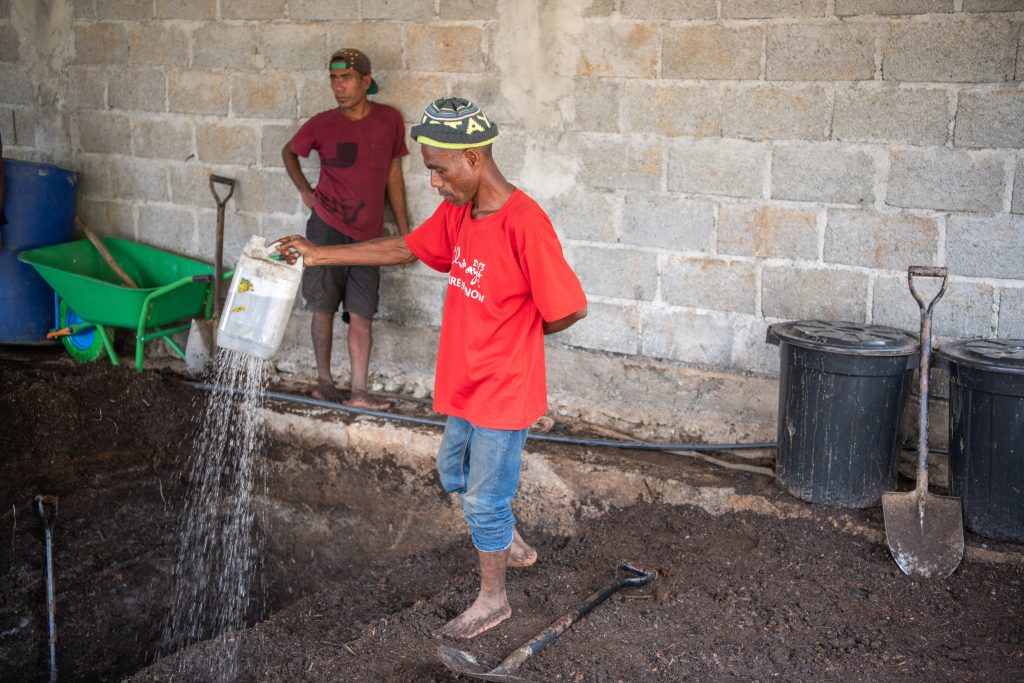
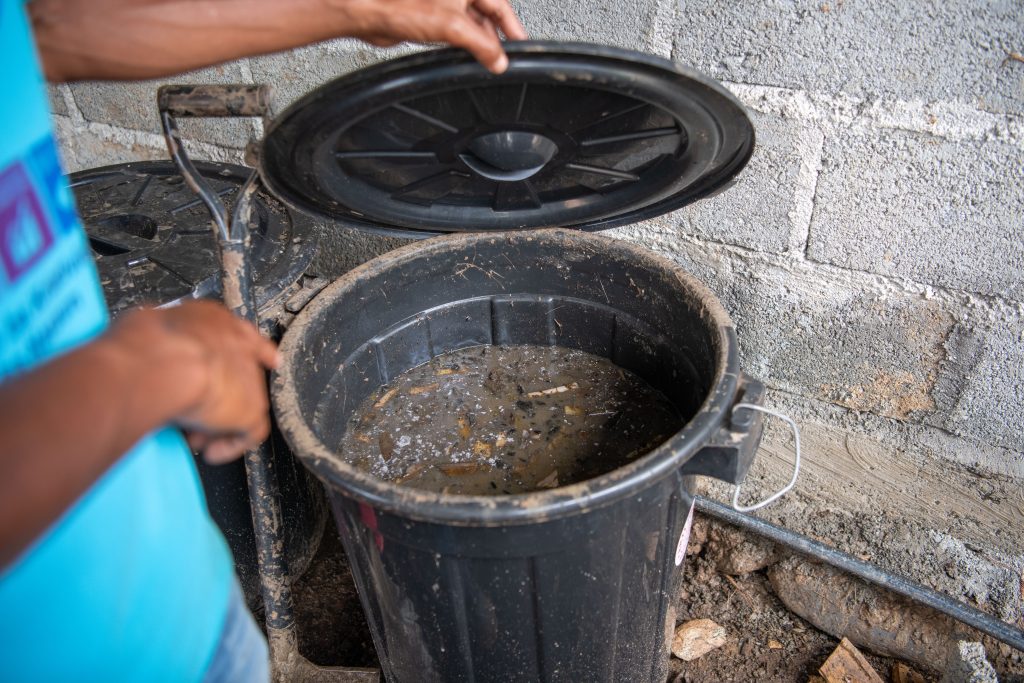
For Zaquiel, success for TILOFE comes not only from selling compost and growing the company, but from finding ways to nourish and encourage growth in the community. “If you want to guarantee to combat poverty, hunger, you need [to be] sustainable,” says Zaquiel. “In TILOFE we sell compost, but we also do the education. If people understand about sustainable agriculture, they will not use chemical compost. Because I talk to them.
“We are making people friends. You are not my client; you’re my friend.”
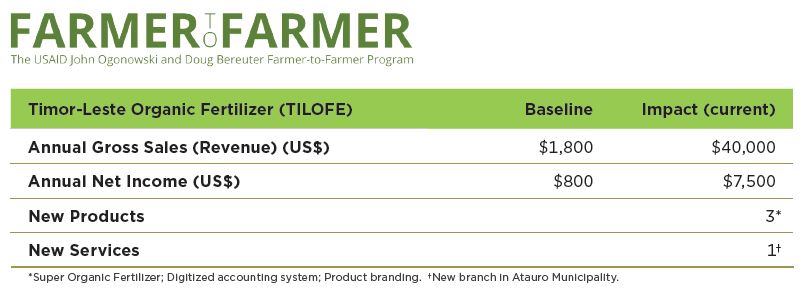
The CRS F2F program is a USAID-funded program focused on reducing hunger,
malnutrition, and poverty across six countries: Benin, Timor-Leste, Ethiopia, Nepal,
Rwanda, and Uganda. The program runs from 2019-2023 and aims to generate
sustainable and broad-based economic growth in the agricultural sector. U.S. volunteers
with agricultural expertise share skills and help build capacity for farmers through
short-term training and technical assistance projects resulting in more productive,
profitable, sustainable, and equitable agricultural systems.
Photos by Holly Powers/CRS